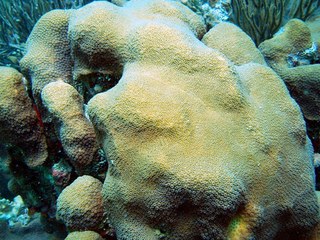Contrary to other findings and general assumptions, Montastraea faveolata colonies appear tolerant to climate change thus far. Helmle, Dodge, Swart, Gledhill, and Eakin took core samples from M.faveolata colonies and analyzed them for annual extension, density and calcification rates. Montastraea faveolata are massive-type corals like Closed Brain Corals.
Helmle writes: “Massive reef-building corals are not as susceptible to declines in Ωarag [aragonite saturation state] as demonstrated by laboratory experiments; local processes, such as high seasonal variation in Ωarag in the Florida Keys, may be temporarily enabling these corals to maintain their historical rates of calcification; the role of Ωarag in controlling calcification is masked amidst considerable natural inter-annual variability; or the actual in situ reef-site carbonate chemistry is decoupled from the oceanic values, which could occur as a result of shifts in benthic community metabolism, mineral buffering and/or coastal biogeochemical processes.”
It’s good to know some corals (albeit naturally slower-growing types) have demonstrated tolerance to climate change. Unfortunately, the same resiliency is not exhibited by the fast reef-building corals such as Acropora, Pocillopora, and Porites.
Reference
Helmle, K.P., Dodge, R.E., Swart, P.K., Gledhill, D.K. and Eakin, C.M. 2011. Growth rates of Florida corals from 1937 to 1996 and their response to climate change. Nature Communications 2: 10.1038/ncomms1222.










0 Comments